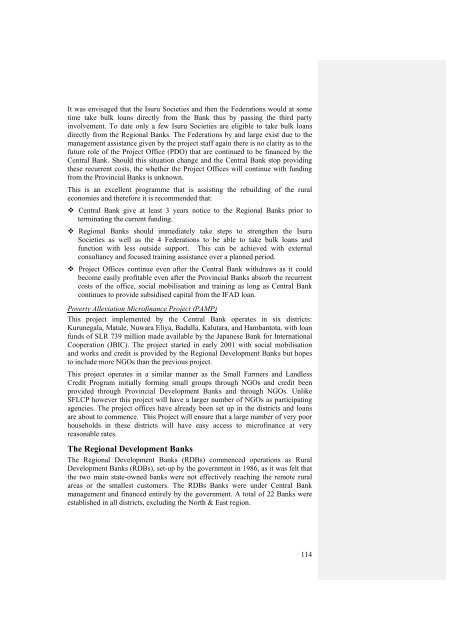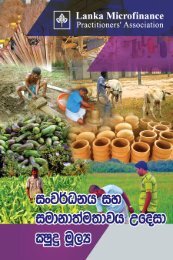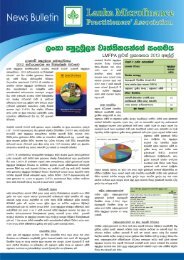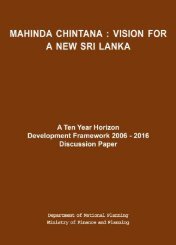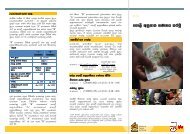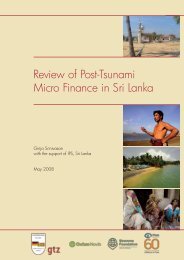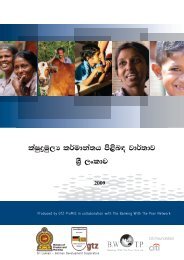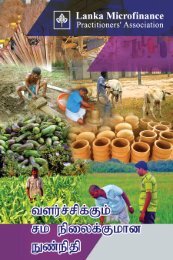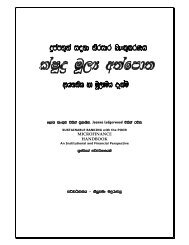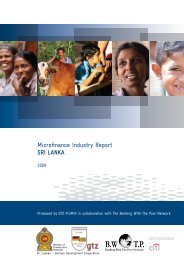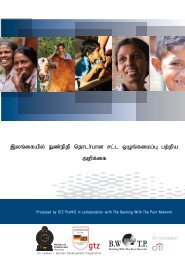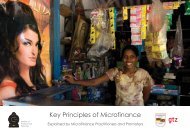National Microfinance Study of Sri Lanka: Survey of Practices and ...
National Microfinance Study of Sri Lanka: Survey of Practices and ...
National Microfinance Study of Sri Lanka: Survey of Practices and ...
You also want an ePaper? Increase the reach of your titles
YUMPU automatically turns print PDFs into web optimized ePapers that Google loves.
It was envisaged that the Isuru Societies <strong>and</strong> then the Federations would at some<br />
time take bulk loans directly from the Bank thus by passing the third party<br />
involvement. To date only a few Isuru Societies are eligible to take bulk loans<br />
directly from the Regional Banks. The Federations by <strong>and</strong> large exist due to the<br />
management assistance given by the project staff again there is no clarity as to the<br />
future role <strong>of</strong> the Project Office (PDO) that are continued to be financed by the<br />
Central Bank. Should this situation change <strong>and</strong> the Central Bank stop providing<br />
these recurrent costs, the whether the Project Offices will continue with funding<br />
from the Provincial Banks is unknown.<br />
This is an excellent programme that is assisting the rebuilding <strong>of</strong> the rural<br />
economies <strong>and</strong> therefore it is recommended that:<br />
Central Bank give at least 3 years notice to the Regional Banks prior to<br />
terminating the current funding.<br />
Regional Banks should immediately take steps to strengthen the Isuru<br />
Societies as well as the 4 Federations to be able to take bulk loans <strong>and</strong><br />
function with less outside support. This can be achieved with external<br />
consultancy <strong>and</strong> focused training assistance over a planned period.<br />
Project Offices continue even after the Central Bank withdraws as it could<br />
become easily pr<strong>of</strong>itable even after the Provincial Banks absorb the recurrent<br />
costs <strong>of</strong> the <strong>of</strong>fice, social mobilisation <strong>and</strong> training as long as Central Bank<br />
continues to provide subsidised capital from the IFAD loan.<br />
Poverty Alleviation <strong>Micr<strong>of</strong>inance</strong> Project (PAMP)<br />
This project implemented by the Central Bank operates in six districts:<br />
Kurunegala, Matale, Nuwara Eliya, Badulla, Kalutara, <strong>and</strong> Hambantota, with loan<br />
funds <strong>of</strong> SLR 739 million made available by the Japanese Bank for International<br />
Cooperation (JBIC). The project started in early 2001 with social mobilisation<br />
<strong>and</strong> works <strong>and</strong> credit is provided by the Regional Development Banks but hopes<br />
to include more NGOs than the previous project.<br />
This project operates in a similar manner as the Small Farmers <strong>and</strong> L<strong>and</strong>less<br />
Credit Program initially forming small groups through NGOs <strong>and</strong> credit been<br />
provided through Provincial Development Banks <strong>and</strong> through NGOs. Unlike<br />
SFLCP however this project will have a larger number <strong>of</strong> NGOs as participating<br />
agencies. The project <strong>of</strong>fices have already been set up in the districts <strong>and</strong> loans<br />
are about to commence. This Project will ensure that a large number <strong>of</strong> very poor<br />
households in these districts will have easy access to micr<strong>of</strong>inance at very<br />
reasonable rates.<br />
The Regional Development Banks<br />
The Regional Development Banks (RDBs) commenced operations as Rural<br />
Development Banks (RDBs), set-up by the government in 1986, as it was felt that<br />
the two main state-owned banks were not effectively reaching the remote rural<br />
areas or the smallest customers. The RDBs Banks were under Central Bank<br />
management <strong>and</strong> financed entirely by the government. A total <strong>of</strong> 22 Banks were<br />
established in all districts, excluding the North & East region.<br />
114


